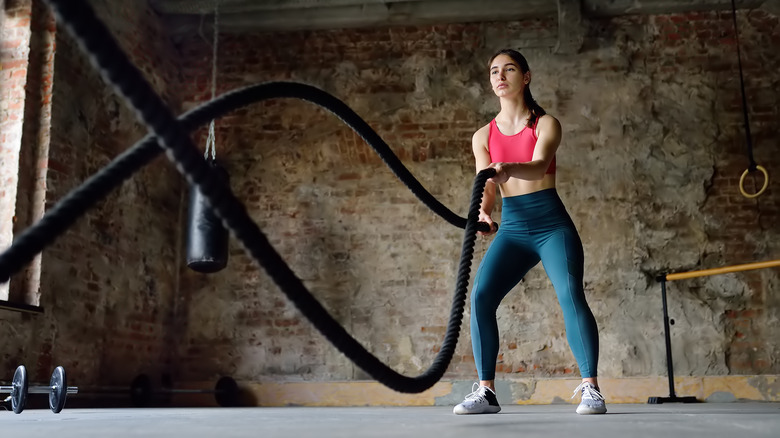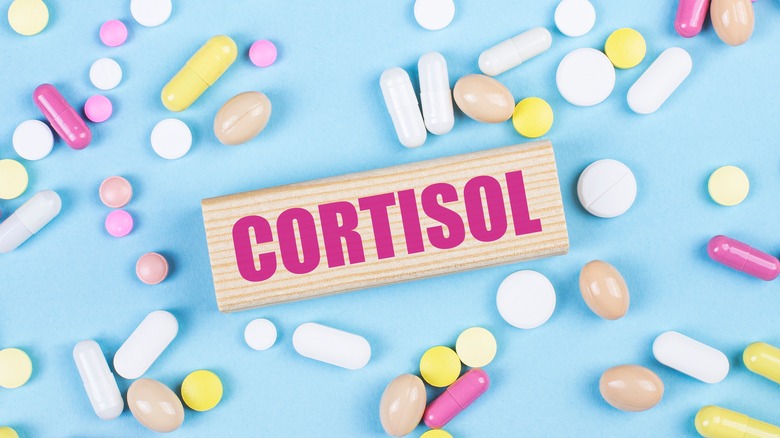The Unexpected Effect HIIT Can Have On Your Stress Levels
Anyone who has ever been given advice on stress management has surely heard that exercise is the key to kicking that tightness in your chest. When we're harboring a constant internal battle between fight and flight impulses, exercise helps to combat the cardiovascular and digestive effects of stress. It supplies you with a rush of endorphins, encourages a meditative state, can increase self-confidence, and lifts your mood (per Mayo Clinic).
Sports psychologist Chelsi Day told U.S. News that aerobic exercises — like walking, jogging, cycling, swimming, and dancing — are the best when you're looking for a quick fix for stress.
But while high-intensity interval training (HIIT) has garnered a lot of attention in the fitness world over the last decade, this form of aerobic exercise in particular might not promote the same sense of relaxation as others. Let's dive in and examine the unexpected effect HIIT exercises can have on your stress levels.
What is HIIT?
HIIT has been implemented by runners looking to boost their performance for over 100 years, but it gained widespread popularity in 2013 when the New York Times introduced the seven-minute workout (per Vox). Fast forward to today and Club Industry has HIIT in the top 10 fitness trends of 2022. And it's no wonder, really. By combining short bursts of intense movement with brief periods of rest or low-intensity exercise, it's designed to give you the best workout in the shortest amount of time (per Healthline).
Todd Astorino, a professor of kinesiology, told Vox that HIIT training has a "strict definition" involving heart rate. When practicing a HIIT workout, a minimum of 80% of the maximum heart rate should be maintained for 1 to 5 minutes before a brief rest. According to Healthline, you will notice the resulting spike in your energy levels after just a few intervals, thanks to the release of hormones like cortisol.
How is cortisol affected by HIIT?
Cortisol, a hormone produced and released by the adrenal glands, regulates blood pressure, impacts the sleep-wake cycle, and regulates the body's response to stress, among other things (per Cleveland Clinic). When we participate in HIIT workouts, the sudden bursts of movement send a signal to the brain that we are running for our lives (per Healthline). The sympathetic nervous system responds by sending out cortisol to assist us in what it believes to be a fight or flight situation.
While some HIIT training can be beneficial, trouble arises when we don't facilitate a balance between high-intensity training and low-intensity workouts. Hannah Almond, Head of Yoga at BLOK, told Insider that's because we are already stressed from our daily lives. Hitting the gym compounds the effect. Healthline explains that when our body overproduces cortisol, it builds up in the bloodstream and can wreak havoc on the body for days after your workout. Too much cortisol is associated with overtraining syndrome. This causes symptoms like chronic fatigue, muscle fatigue, sleeplessness, anxiety, changes in mood and motivation levels, and an impaired immune system.
Being in a constant state of stress takes such a toll on the body that it can actually negate the benefits of HIIT, so quality rest days are important. The National Academy of Sports Medicine says that the key to proper recovery lies in good sleep, hydration, and healthy eating. To get the most out of your workouts and avoid overtraining, HIIT should be limited to 2 or 3 days a week, with rest days sprinkled between them.



